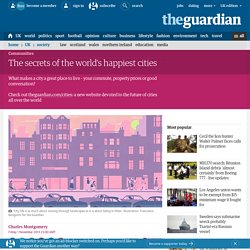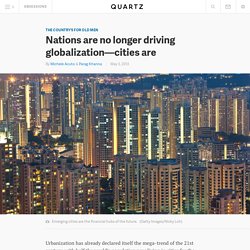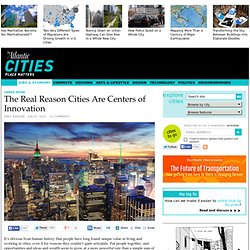

Emile HOOGE on Twitter: ""market forces shape cities in very particular ways for the benefit of very particular interests" #flawedcityrankings" The secrets of the world's happiest cities. Two bodyguards trotted behind Enrique Peñalosa, their pistols jostling in holsters.

There was nothing remarkable about that, given his profession – and his locale. Peñalosa was a politician on yet another campaign, and this was Bogotá, a city with a reputation for kidnapping and assassination. What was unusual was this: Peñalosa didn't climb into the armoured SUV. Instead, he hopped on a mountain bike. His bodyguards and I pedalled madly behind, like a throng of teenagers in the wake of a rock star. A few years earlier, this ride would have been a radical and – in the opinion of many Bogotáns – suicidal act. I first saw the Mayor of Happiness work his rhetorical magic back in the spring of 2006.
Peñalosa insisted that, like most cities, Bogotá had been left deeply wounded by the 20th century's dual urban legacy: first, the city had been gradually reoriented around cars. In the third year of his term, Peñalosa challenged Bogotáns to participate in an experiment. Nations are no longer driving globalization—cities are - Quartz. Urbanization has already declared itself the mega-trend of the 21st century, with half the world’s population now living in cities for the first time in human history.

While the implications for economic growth have been widely discussed, urbanization’s impact on diplomacy and sovereignty will be equally profound. Consider just two major issues on the global agenda: security and climate change. After the 9/11 terrorist attacks on New York City and the November 2008 terror attack on Mumbai, both cities moved to strengthen their own security services and intelligence capabilities beyond what Washington and Delhi could provide and mandate. The Mideast’s iconic Dubai has long done the same beyond the shadow of federal Emirati capital Abu Dhabi. Now look at climate change. As cities continue to arrogate major diplomatic and economic functions, should we still be talking about international relations?
We welcome your comments at ideas@qz.com.
The Real Reason Cities Are Centers of Innovation - Emily Badger. It’s obvious from human history that people have long found unique value in living and working in cities, even if for reasons they couldn’t quite articulate.

Put people together, and opportunities and ideas and wealth seem to grow at a more powerful rate than a simple sum of all our numbers. This has been intuitively true for centuries of city-dwellers. "What people didn’t know," says MIT researcher Wei Pan, "is why. " There have been plenty of theories. Adam Smith famously figured that people become more productive when we’re able to specialize, each of us honing a separate area of expertise. "We think there’s an underlying completely different way of thinking here, which is very different from the economist’s way of thinking," says Pan, a doctoral candidate in computational social science in the MIT Media Laboratory's Human Dynamics Lab.
Via Desmos As for why this happens, though, Pan pushes aside theories about the location of manufacturing or the specialty of trade.